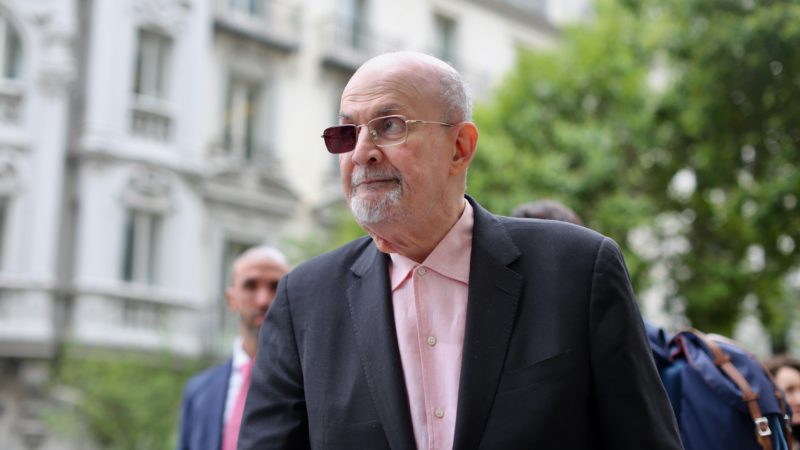Salman Rushdie wrote about his attempted murder. Now he will face his attacker in court
A trial has begun for the man accused of violently stabbing Salman Rushdie onstage at a literary event in 2022, which left the British author permanently blind in one eye.
Lawyers for Rushdie and the alleged attacker, Hadi Matar, delivered opening statements inside the Chautauqua County Courthouse in Mayville, N.Y. on Monday.
Matar, a 27-year-old from Fairview, N.J., has pleaded not guilty to charges of attempted murder and assault.
The trial was postponed last year to give Matar’s public defender time to read Rushdie’s memoir Knife: Meditations After an Attempted Murder, about the violent attack and his road to recovery.

In August of 2022, Rushdie was poised to speak at the Chautauqua Institution in western New York when a man ran to the stage and repeatedly stabbed the author. In addition to blinding an eye, knife attack left Rushdie with almost no feeling in two fingers on his left hand.
Matar was soon arrested. Two years later, federal authorities accused Matar of engaging with Hezbollah, an Iran-backed militant group in Lebanon, which is designated as a terrorist organization by the U.S.
A separate, federal indictment alleges that Matar provided “material support and resources” to Hezbollah starting in September 2020, in an attempt to carry out a fatwa on Rushdie calling for his assassination, issued by Iran’s supreme leader Ayatollah Khomeini in 1989.
The fatwa was spurred by the release of Rushdie’s 1988 novel, The Satanic Verses, which the Ayatollah saw as blasphemous in its portrayal of Islam and the Prophet Muhammad.
Rushdie spent much of his life in hiding as a result. After the Ayatollah died in 1998, the Iranian government stepped back from the fatwa, saying it would “neither support nor hinder assassination operations on Rushdie.”
According to the indictment, Matar was partly motivated by a 2006 speech from Hezbollah Secretary General Hassan Nasrallah endorsing the fatwa.
The terrorism-related federal charges are separate from the murder and assault charges. Both trials are ongoing. Matar could face life in prison for the terrorism offenses alone, according to the U.S. Attorney’s Office in the Western District of New York.
Last year, Rushdie released Knife, in which he detailed his near-death experience and the toll it took on him physically and mentally. In an interview with NPR’s Fresh Air about the book, Rushdie recalled the moment of the attack.
“I confess, I had sometimes imagined my assassin rising up in some public forum or other and coming for me in just this way. So my first thought when I saw this murderous shape rushing towards me was, so it’s you. Here you are,” he said last April.
“This was my second thought. Why now? Really? It’s been so long. Why now after all these years?” He added.
Alabama Power seeks to delay rate hike for new gas plant amid outcry
The state’s largest utility has proposed delaying the rate increase from its purchase of a $622 million natural gas plant until 2028.
Former U.S. Sen. Doug Jones announces run for Alabama governor
Jones announced his campaign Monday afternoon, hours after filing campaign paperwork with the Secretary of State's Office. His gubernatorial bid could set up a rematch with U.S. Sen. Tommy Tuberville, the Republican who defeated Jones in 2020 and is now running for governor.
Scorching Saturdays: The rising heat threat inside football stadiums
Excessive heat and more frequent medical incidents in Southern college football stadiums could be a warning sign for universities across the country.
The Gulf States Newsroom is hiring an Audio Editor
The Gulf States Newsroom is hiring an Audio Editor to join our award-winning team covering important regional stories across Mississippi, Alabama and Louisiana.
Judge orders new Alabama Senate map after ruling found racial gerrymandering
U.S. District Judge Anna Manasco, appointed by President Donald Trump during his first term, issued the ruling Monday putting a new court-selected map in place for the 2026 and 2030 elections.
Construction on Meta’s largest data center brings 600% crash spike, chaos to rural Louisiana
An investigation from the Gulf States Newsroom found that trucks contracted to work at the Meta facility are causing delays and dangerous roads in Holly Ridge.









